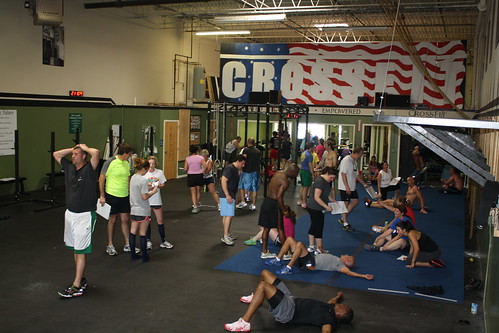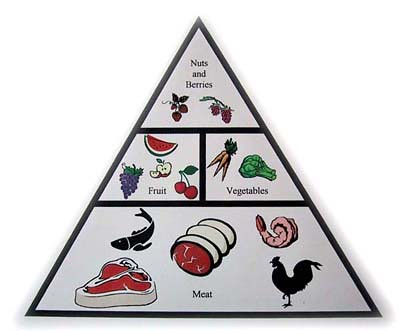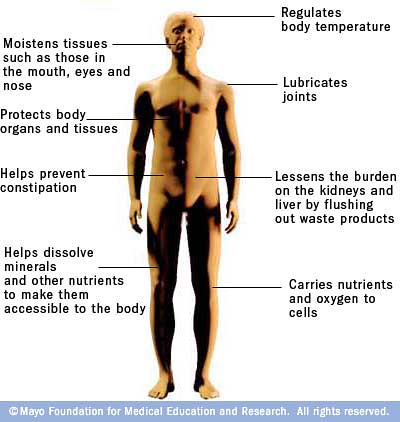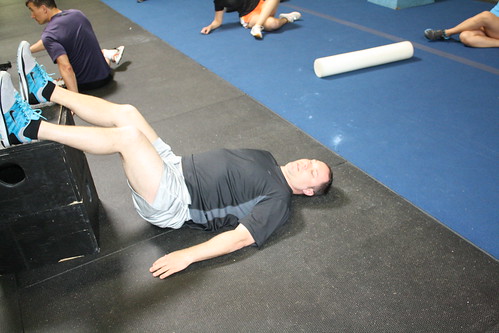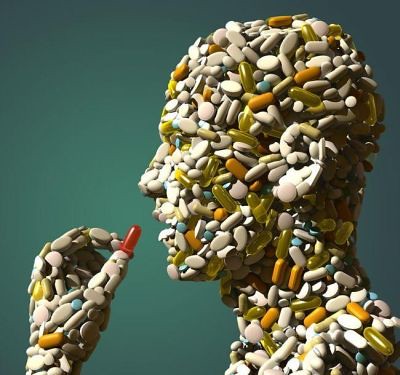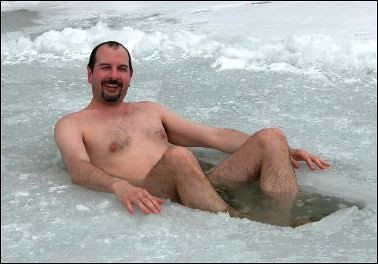Let’s face it, we train, and we train hard. ?CrossFit at it’s very essence is based off of constantly varied, functional movements, performed at high intensity. ?The last part of that sentence is what can wreak havoc on the body both in good and bad ways. ?Training stresses the body in three different ways. ?Psychologically, it wears down your mental state. ?The training sessions that we do are very mentally taxing. You have to psyche yourself up to do it, and many times you’re exhausted when you finish. ?You go through mental highs and lows in the training. ?It takes time off to help your brain feel better about training. ?Neurologically; the high intensity training that we do can actually stress out and wear down your central nervous system. ?It takes time and recovery techniques to help you feel better here as well. ?Finally, physiologically. The training sessions that we do cause damage (albeit in a good way) to your muscles and sometimes your joints. ?It also causes hormonal changes that need to be mitigated. ?Of course, all these things are both good and bad. ?They are necessary occurrences if you want to adapt and become more fit. ?They become problems if we do not control these issues, or let them get out of hand by over training or not practicing good recovery protocols.
Recovery is key and we are going to take a few moments to delve into what exactly are the most beneficial things to aid in recovery.
Sleep
We can safely say that if sleep is not adequate, NOTHING else that you do will matter much. ?No amount of supplementation, nutrition, or ice baths will benefit you like sleep will. ?If you follow any of the smart guys like Robb Wolf or James Fitzgerald they all talk about how critical sleep is to the equation of performance. ?Not only does sleep provide rest, but it affects among other things hormonal regulations. ?If you skimp on sleep it will affect serotonin, dopamine, cortisol, human growth hormone and not to mention testosterone. ?This by no means is an exhaustive list. ?Chronic lack of sleep coupled with intense training can also lead to increased cortisol levels, which leads to blood sugar regulation problems. ?This can also lead to adrenal fatigue.
T.S. Wiley in his book Lights Out, Sleep Sugar and Survival has some great pointers on how to help your sleep. ?In the book he talks about how any light at all will affect your melatonin production. ?Melatonin production is critical to health, and recovery and should not be supplemented as it causes you to down regulate your own production. ?Sleep in a completely dark room and cover up your alarm clock. ?Also, in order to maximize melatonin production you should sleep at least 8 hours a night and shoot for 9 if possible. Humans are made to sleep based off the Circadian Rhythm. ?Ideally we are programmed to sleep when it gets dark and awake when it gets light out. ?Unfortunately, or fortunately we have lives to attend to and most people do not abide by these principles. ?In light of that, try to be in bed no later then 10 and get 8 hours! Capish? Also lowering the temperature when you sleep will help as well. ?Alright enough of that rant, I’m putting myself to sleep!
Nutrition
We talk about nutrition extensively, so I’m going to be brief here. ?Meats, veggies, nuts, seeds, some fruit. ?Cut out grains, dairy, legumes, starches, and sugar. ?AKA The Paleo Diet. ?This is the most anti inflammatory diet I have ever seen. ?It is also well researched. ?If you have the right fuel in the body, it’ll perform better. ?’Nuff said.
Post Workout Nutrition
This is always a hot topic of debate. ?There are many circles that believe you don’t need much for post workout nutrition. ?I’m in the 50% camp. ?I think 50% of people could benefit from PWO and 50% don’t need to worry about it. ?If you are very athletic with little body fat, PWO is critical. ?If you are 40 year old soccer mom with 28% BF, PWO isn’t as important. ?The point of PWO is to replenish glycogen stores in your liver and your muscles directly after a workout. ?If you hold on to body fat, some studies suggest that waiting more then an hour after workout before you eat is actually beneficial, it can increase your insulin sensitivity (a good thing) and also increase your fat burning. ?As always it depends on where you are and what your goals are. ?It is pretty neat to note a phenomenon called non insulin regulated glucose uptake. ?Directly post workout, your cells will uptake sugar into the muscles without the use of insulin. ?Therefore, you can get away with a little bit higher carbohydrate consumption without negatively affecting your body fat. ?Don’t go hog wild here, just interesting to note! Here’s a great formula for figuring out what you should eat post workout by James Fitzgerald:
post wod fuel male:
above 12% – 30g prot/10g carb
8-12% – 30g prot/25g carb
below 8% – 30g prot/40g carb
post wod fuel – female:
above 16% – 20g prot/10g carb
12-14% – 20g prot/20g carb
below 12% – 20g prot/30g carb
eat a balanced PFC meal 45-60 min after post wod fuel for everyone (P=protein, F=fat, C=carb)
This is really pretty brilliant as your body fat shows how carb tolerant you are, so you can’t really go wrong with this formula. ?If you don’t want to stress about it too much and are trying to lost body fat, ditch the post workout stress and just go eat a meal after your workout. ?You’ll be ok!
Cortisol is increased after high intensity workouts. ?Stress and cortisol can be mitigated by rest and feeding. ?Have we covered these so far? Check and Check! ?Moving on!
Hydration
This probably goes without saying, but I’ll say it anyway. ?DRINK your water. ?Not tea, or soda, or beer, or juice, or coffee, or any of other fluid with crap in it, but water. ?The best formula I’ve seen is 1/2 your body weight in ounces of water. ?1 ounce = 29.57ml. ?If I weigh 185lbs, how much water should I be drinking a day in Liters? ?Wait for it……2.74L.
Training causes you to become dehydrated. ?It also breaks down cells and causes cell debris that needs to be flushed out of your body. ?It also causes acid accumulation. ?How do we buffer the acid and flush things out? ?Water. ?’That was easy’ comes to mind! ?To optimize recovery, drink your water. ?Come to the gym hydrated as well. ?If you are dehydrated when you get here, you are going to decrease your performance, increase your risk of injury, and make yourself more sore for the next 3 days. ?Get a bottle and drink it!
Back Off
It’s important to know when to hold them and know when to fold them. ?Listen to your body, if you have been feeling beat up and run down for weeks, maybe it’s time to take a couple of days off. ?Reset your body. ?Replenish your batteries. ?You can also back off with intensity. ?Maybe don’t load the bar all the way up.
Periodize
We actually take this into account at CFB. ?Our program has intense days, and non intense days. ?We have de-load weeks, and heavy weeks. ?We plan a schedule that by it’s nature allows for adaptation and active rest. ?I bet you had no idea! ?We actually just had a de-load week last week.
Active Recovery
Don’t just sit on your butt to recover. ?Get out and get some blood flowing. ?This will actually aid in your recovery. ?Do something low intensity like rowing, biking, jogging or just walking. ?Get a little blood flowing and it’ll flush out a ton of soreness and metabolites (nasty buggers that make you feel bad). ?You can also do a therapeutic massage, or foam rolling and mobility work (Chris covered this extensively in a previous post). ?All of these things will aid you into getting back to 100%.
Smart Supplementation
I’m hesitant to mention supplementation. ?Many people think, rather then actually expending an effort, we can just pay for a magic pill in a bottle. ?There are few things that work and or work well. ?Here is my short list of important supplements.
ZMA or Zinc, Magnesium and B6- ?Our diet tends to be low in all three of these things. ?Zinc helps with immunity and testosterone. ?Magnesium is used in almost all cellular activities. Magnesium also allows your muscles to relax. ?B6 helps with brain chemicals. ?All of these things taken at night enhance and cause a deeper sleep. ?Money maker!
Fish Oil- ?Omega 3’s have so many benefits it’s ridiculous. ?From helping with your skin, eyes and hair, to decreasing inflammation, helping brain function, decreasing systemic inflammation, they are critical to good health.
Vitamin D- ?This one is also involved in an astounding amount of bodily activities. ?There have been studies that show Vitamin D’s positive outcomes on increasing power output, optimizing testosterone levels, building bone density, decreasing cancer risks, and increasing your immune system just to name a few. ?Why aren’t you taking this?
Dr. J Cannell, Vitamin D researcher recommends 1,000 IU’s per 25lbs of body weight.
Cryotherapy
This is the last thing I will talk about in this post. ?Cold therapy has been shown to dramatically increase recovery rates. ?My background as a Certified Athletic Trainer makes me well acquainted with all the positive uses for ice. ?One of the best ways to ice a large area to help recovery is an ice bath. ?That’s right, fill your tub up with ice water and submerge yourself into it. ?Provided that you do not have a cold allergy of course. ?The greater % of your body that is submerged the less time you can healthily stay in the ice. ?If you have just your hips and legs in stay between 7-12 mins. ?If you have over your abdomen and chest do not exceed 10 minutes. ?I also wouldn’t do this more then 1 time per day. ?Unless you have two extremely physically demanding training sessions in the same day. ?(CrossFit Games competitors) The research has shown that up to 2 hours after you get out of the ice submersion, the space inside the joints continues to cool off. ?This will positively affect your inflammation.
Contrast baths have also been shown to make you feel better. ?The research is inconclusive on whether they make physiological changes, but everyone who does this states that they feel better after, so if you feel froggy, have at it. ?The protocols here are usually 2:1, 2 units of time in the hot water and then 1 unit of time in the cold water. ?For example, 2 minutes of hot shower, to 1 minute of a cold shower. ?This can be done 8 to 10 times depending on your tolerance for a high water bill. ?If for nothing else, it’ll definitely wake you up in the morning without the use of caffeine.
Good Luck with your training and happy recovering!
